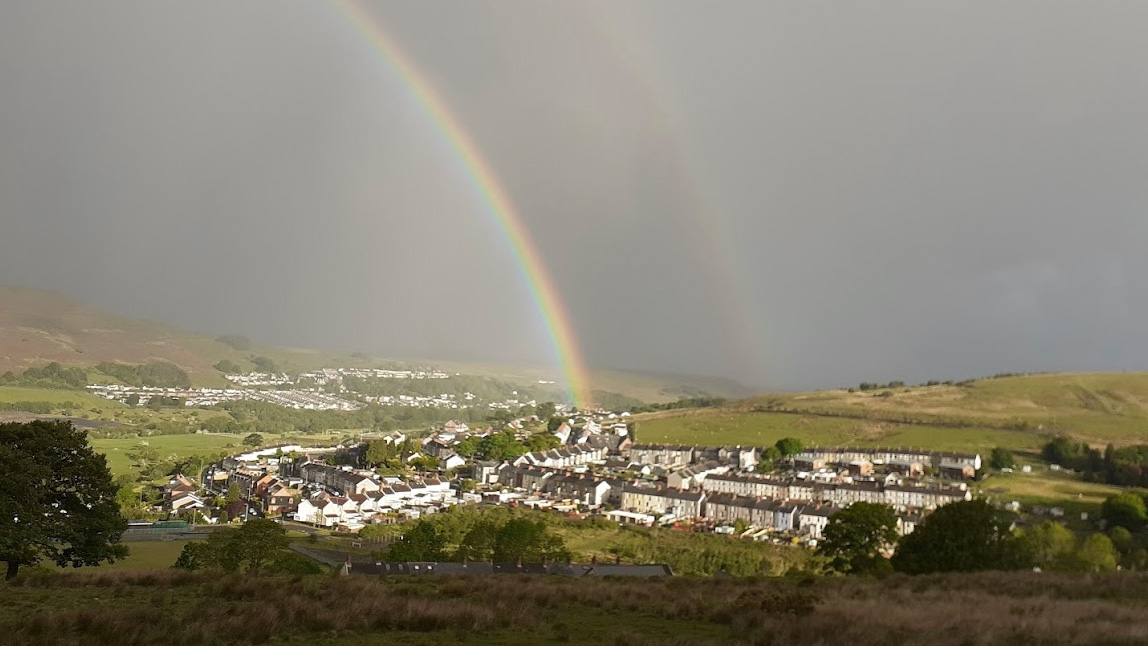Areas once thriving with industry now grapple with depopulation and suffer decline. Can local initiative and power of the community rekindle a flicker of hope for the Valleys?
Small houses lodged beneath the green hills, an empty-looking community centre and barely any phone service was quite a change for then recent graduate Hannah from Cardiff. As a community caseworker for a public advice service, she was regularly sent to the Rhymney and Rhondda Valleys to help the locals with the issues of benefits and advice on employment.
Places like Penrhys, Abertysswg, Fochriw, that were once home to mine and industry workers in the previous century are now among areas with the most rapidly declining population. Due to closure of the mines, lack of employment and reduced infrastructure, many people choose to leave the Valleys. Many of the remaining have to rely on income support or full benefits.
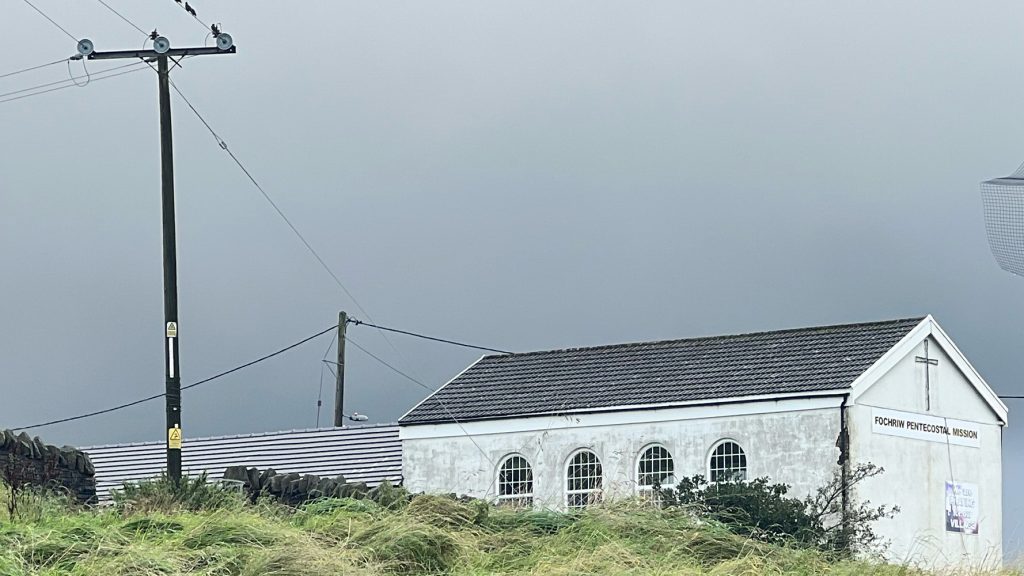
“There is this sadness, that we have lost what was a big part of the Welsh identity that mining was. And nothing came to replace it. There aren’t any job opportunities: there doesn’t seem to be anything other than to leave your community and go to the city,’ says Hannah Martinez who worked closely with the people in the valleys between 2013 and 2020.
Hanna’s job for the charity consisted of helping people appeal decisions on their benefits applications, providing regulated advice regarding employment and domestic issues. During open hours in any community centre in the valleys, Hannah would often notice that not a lot of events seem to take place in the village, and many local amenities like schools, GP surgeries, even clubs and pubs were standing empty or were closed down.
The census between 2011 and 2021 shows Caerphilly and Blaenau Gwent to have lost about 6000 people, of which many were young people moving away to seek employment. Hannah recalls the trend of severe unemployment pushing people away vividly from her job. She says, ‘many people would have their benefits cut, because they would refuse to take a job in Cardiff. When they came to see me, they would say they couldn’t even afford the train to Cardiff until they’d get paid’.
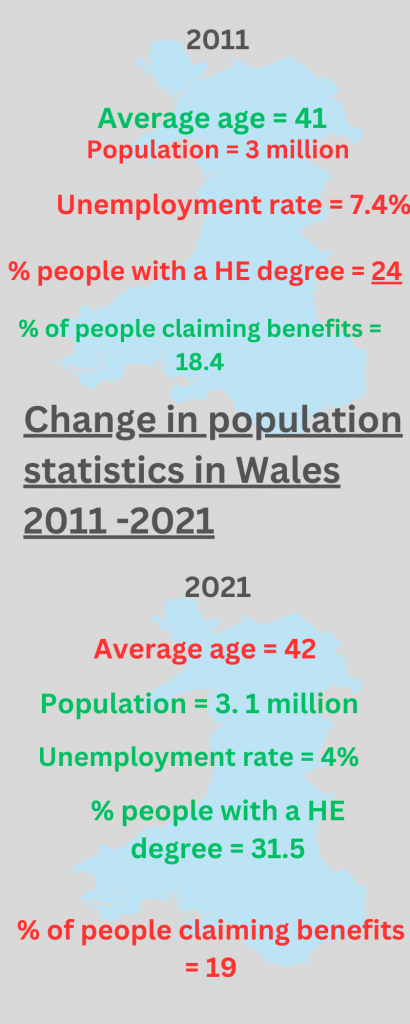
The lack of jobs has led parts of Wales to notorious poverty, and that has led to many of the once-flourishing areas to being classed as deprived. The bad reputation and the rough status of many towns have led to less people choosing to move there, which, in turn, has led to less governmental investment, worse infrastructure and more deprivation.
This status was not welcome by the people who have lived and worked in the valleys their whole life and whose parents proudly built up the local communities. As economic landscapes change, so do cultural expressions. Many of the traditions once prevalent in these regions risk being lost. It’s not just about employment or infrastructure; it’s also about preserving a way of life.
‘I would want to move here from anywhere else. It’s a lovely village with lovely people who look after each other, but people go [away] because of work. It would breathe a bit of fresh air into the village to have some young people come here, but they don’t want to, they would rather go to Cardiff and live in Caerphilly,’ says Edward Chapman, an active member of the Fochriw community and a community councillor for the local area since his recent retirement.
Having been born and raised in Fochriw in the 50s and 60s, he had seen the village and the valleys when they were at their finest. As time passed, and Edward Chapman stayed in the village, he saw it lose its youth and become a quiet remnant of the ‘good old days’.
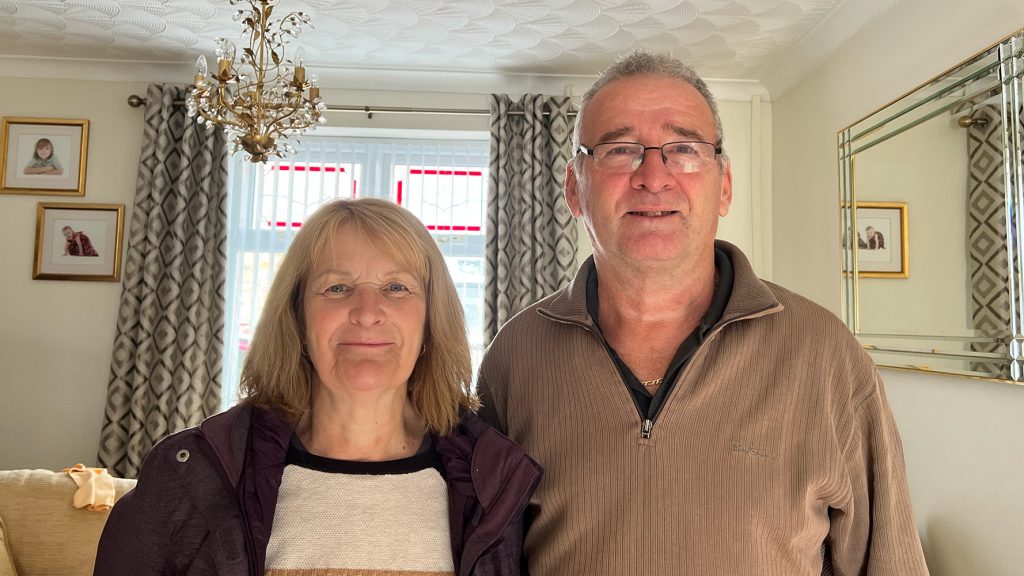
He says, ‘I worked for the local authority for about 27 years, looking over cemeteries, parks and those things. And when I retired early, they all told me; you know how local government works, you are doing things in the community, you should go and represent us as a community councillor. And I was lucky to get elected.’
To keep the village community centre open for the remaining young people, councillor Chapman has become chair of the centre, and has also gone to become the chair in the governors’ boards at the local primary school.
Seeing a respected member of the local community fight to keep the village alive, many others petitioned for the local centre to stay open. And having received support from the people, the community centre was able to set up more activities for children and families of the village.
With clubs and activities now available to their children, the local parents grew to support the councillor’s initiative and supported his initiative of bringing more education to the local primary school, which at the time was classed as ‘at risk’ for the lack of facilities.
The new community-elected headteacher of the school, Mrs Sharon Pascoe has led the school to receive the School of the Year award in 2020 and to have Fochriw Primary be titled Best School in Caerphilly county in 2022.
Mrs Pascoe attributes the success of the school to the unity of Fochriw residents and to the support she has received from families in the village. Despite the challenges, she is one of the people dedicated to improving the status of the Valleys and the quality of life there. In a recent interview to a local newspaper she said, ‘We’re in a difficult area, with high deprivation, a lot of crime and with many children receiving free school meals. We might have had this difficult past and experienced lots of change, but the standards are still there and the children are achieving and thriving, and that’s something to celebrate’.
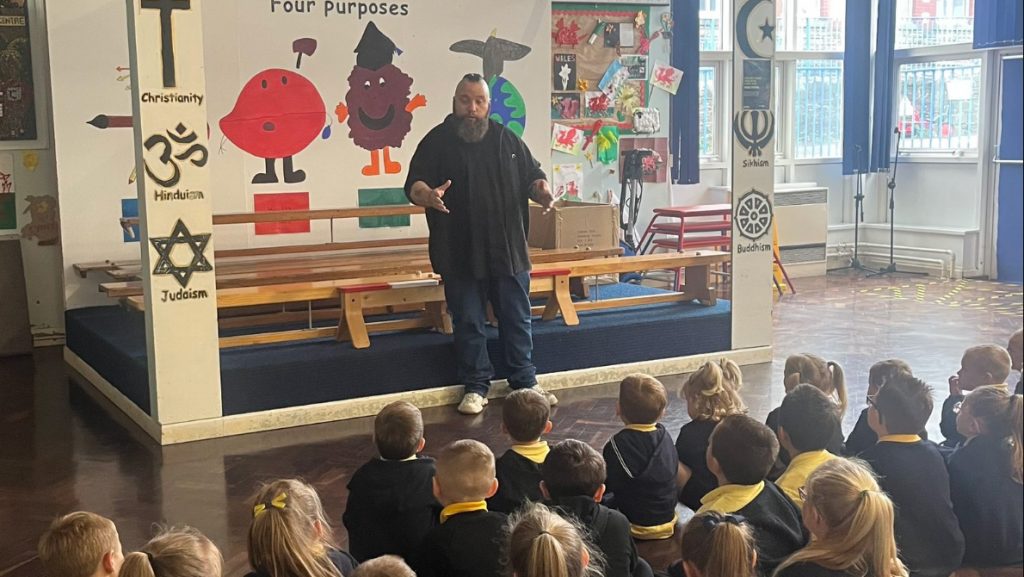
Local residents call the school the ‘crown jewel’ of Fochriw and are very proud that their children get to feel the pride for their community and not only receive the stigma of a forgotten mining village. However, schools like Fochriw are the exceptions rather than the rule.Many schools in the region grapple with outdated resources, a lack of specialised training for teachers, and fewer extracurricular opportunities when compared to their counterparts in bustling urban areas.
Last year, Edward Chapman got elected as a county councillor and is now working with five other villages near Fochriw. He attributes all the success of his local campaigns for the school and the community centre to the locals, he says, ‘well, it’s all thanks to the teachers, and the parents who have worked together, and the children are now thriving’.
He says that he is hoping for more stories of success like that of Fochriw Primary, to rebuild the community and have more people consider moving to the area. Yet the only problem that remains, is the lack of big employers that would tip population dynamics in favour of the Valleys.
In recent times, the Welsh Government has started recognising this need and has initiated a slew of measures aimed at revitalising the Valleys. The ‘Tech Valleys’ initiative launched in 2021 aims to make South Wales a global destination for businesses and workers in the tech sector by 2030. While it is still in its early stages, there are signs of success, with a few tech start-ups setting up base in the Valleys in the last year.
Tech Valleys encourage big companies to move their office to the new tech hub in Ebbw Vale. One of them that already has is EE, a phone service provider and now a big employer in the region. As more companies are yet to get on board this initiative, the investment is already showing positive change in the region.
With the construction of the new tech hub, and potential of arrival for new employers, the government has supported the restoration of various regular transport links North of Cardiff, has implemented new STEM education programmes in local schools and colleges. In the long-term perspective, this would encourage the young people in the Valleys to go to university, but come back to their communities for qualified jobs. That is expected to be in place by 2030.
‘We’ve got a couple big firms up here. EE in Merthyr, my grandson works there, they are tremendous, but most of the jobs are manufacturing at the moment. Until there are proper jobs around, you need to go down the Valley [to Cardiff] for jobs,’ said councillor Chapman.
Most people who are able to leave the Valleys for university rarely come back to live in their home towns and villages. Educational establishments even in Wales are referring their graduates to work in big cities. Statistical measurements for employability will show up as a better outcome if a graduate doctor sets up a practice in Reading, England than if they do in the Rhondda Valleys as reading has more population and is a more lively area than somewhere known to be in decline.
Steve Westlake, a careers consultant at Cardiff Metropolitan university says, ‘Cardiff is a very nice place for a business to open an office in, so new jobs do appear that we can refer students to here in the city, but we really don’t have that many connections with any companies in the rest of Wales. We mostly have people moving to work here in Cardiff or moving on to work elsewhere in the UK’.
The Tech Valleys is an impressive and a long-awaited project, but it will take more time and investment for companies that settle there with universities and before the Valleys are considered an employability destination in Wales and beyond.
With the promise of better jobs in the next ten years, the residents remain hopeful but today are still struggling for basic necessities.
Edward Chapman says, ‘We need health workers, we are crying out loud. For the people who live here now, the council is struggling to attract workers. It’s horrendous at the moment. The pensioners who live here have to travel about an hour by bus to pop to the doctor’s’.
The current population of the Valleys is ageing, more people require access to provisional medical care, but with the deprived status of the region and lack of amenities, the government is struggling to encourage doctors to open practices in the area.
‘I’ve lived in the village all my life, and my parents did before me. The village itself had the exodus
Everything is closing , and that’s due to economic change, there is not enough money,’ says Edward Chapman.
The lack of funding and the population decline in the valleys are a trend that leads to the local communities being destroyed. Despite the inspiring efforts of people like headteacher Pascoe and councillor Chapman, more support has to come to the region to preserve the invaluable culture and communal spirit of previously mining towns and villages.
In the decade of her work in the valleys, Hannah Martinez has grown to really appreciate the community spirit in the villages, as well as realised the current predicament of the region, unless huge change is implemented.
‘The projects that I was working with were specifically targeted to making sure these areas had advice, because people wouldn’t be able to afford transport to a bigger city to access advice about employment issue or housing issue. It was really important that we were embedded into the community, to give people an opportunity to access timely free advice,’ she says.
The depopulation and unemployment have undeniably affected the Valleys. However, the inherent spirit of these communities remains strong. Many among the older generation hold onto hope, support local initiatives, and try to keep the community spirit alive. But for a long-term solution, there’s an evident need for strategic interventions – economic, infrastructural, and socio-cultural – that can encourage the young to stay, return, and reinvest in their communities.
Hannah herself has recently moved to London for a job opportunity, yet she hopes to come back to Wales in the future. She says, ‘I still want to come back to Wales, Wales is home. Wales and especially the Valleys give you such a beautiful sense of community, it is just a shame at the moment to see them in such decline’.
